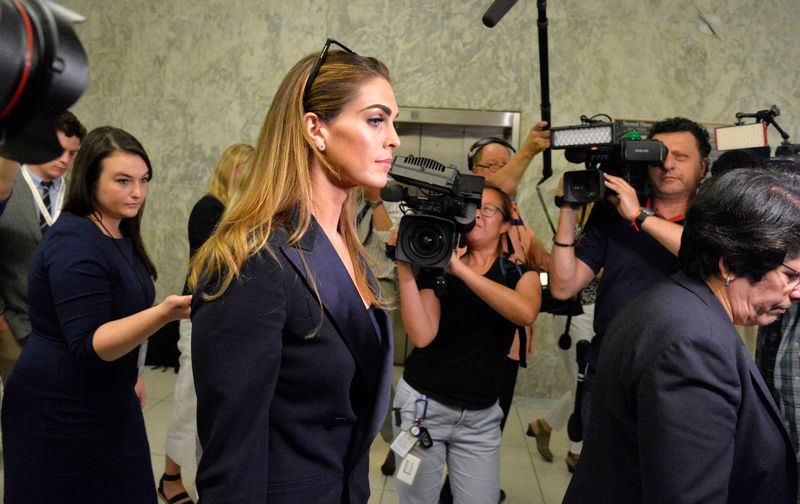By Jan Wolfe
WASHINGTON (Reuters) - A White House lawyer cited "testimonial immunity" in instructing Hope Hicks, a former top aide to President Donald Trump, not to answer questions about her White House tenure in a closed-door congressional interview on Wednesday.
What does that mean and would it hold up in court?
Trump has for months been stonewalling U.S. House of Representatives Democrats' investigations of him, his presidency and his business holdings, telling current and former administration officials to ignore subpoenas seeking testimony and documents.
WHERE DOES THE "IMMUNITY" ARGUMENT COME FROM?
On May 20, on the eve of a scheduled congressional hearing for former White House Counsel Don McGahn, the Department of Justice issued a legal memo arguing that Congress could not compel testimony from former senior advisers to the president.
The memo said recent presidents from both political parties adopted similar arguments during standoffs with Congress.
"Testimonial immunity" is not mentioned in the U.S. Constitution, and the Supreme Court has not squarely addressed the doctrine. But the Justice Department argues the doctrine is grounded in basic constitutional principles.
The U.S. political system is founded on the idea that the White House and Congress are co-equal branches of government. The Justice Department has long reasoned that Congress cannot compel testimony from the president because that would make him look subordinate. The president's senior aides are an extension of him, so they cannot be forced to testify either, the Justice Department has argued over the years.
CAN DEMOCRATS CHALLENGE THIS ARGUMENT IN COURT?
Yes. The only judge ever to address the doctrine of testimonial immunity forcefully rejected it.
That 2008 ruling came in a dispute over a subpoena for testimony from Harriet Miers, who was White House counsel to former Republican President George W. Bush.
U.S. District Judge John Bates said that "there is no judicial support whatsoever" for the notion that a president's advisers have absolute immunity from testimony, and that adopting such a view would "would eviscerate Congress’ historical oversight function."
The judge also said testimonial immunity seemed at odds with the reasoning in Clinton v. Jones, a U.S. Supreme Court decision holding that a president is not shielded from civil lawsuits unrelated to his official duties.
"If the president must find time to comply with compulsory process in a civil lawsuit, so too must his senior advisers for a congressional subpoena," Bates said.
CAN TRUMP'S FORMER AIDES IGNORE HIS INSTRUCTIONS AND TESTIFY?
Yes. One wrinkle here is that Trump cannot block his former aides, who are now private citizens, from speaking to Congress if they want to. But Hicks and even McGahn, who has a strained relationship with the president, have so far followed his instructions and provided little help to congressional investigators.
IS TESTIMONIAL IMMUNITY THE SAME AS EXECUTIVE PRIVILEGE?
No, but they are related.
Like testimonial immunity, executive privilege allows a president to order subordinates to ignore congressional demands for information.
The doctrine is generally used to keep private the nature of conversations a president has with advisers, or internal discussions among executive branch officials.
The idea is that the White House operates more effectively if a president and aides can engage in private, candid conversations, without worrying about public scrutiny.
Executive privilege is generally used to refuse to answer specific questions, while testimonial immunity is used to foreclose an entire area of questioning or avoid a congressional hearing.

The two doctrines also have different limits. A Supreme Court case from 1974, U.S. v. Nixon, is widely understood to mean that executive privilege cannot be used to cover up wrongdoing. That view was endorsed by current U.S. Attorney General William Barr during his Senate confirmation hearing.